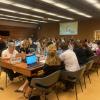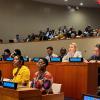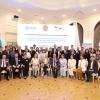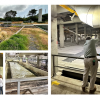News
Displaying Results 1 - 25 of 433
South Sudan, the world’s newest nation and a landlocked country in Eastern Central Africa, is situated in the middle of the basin of the Nile River, Africa’s longest river. Sharing significant transboundary wetlands, experiencing annual catastrophic floods and droughts and facing immense…
Civil society plays a vital role in addressing major environmental challenges. To fully harness this potential, ongoing efforts are essential to uphold the public rights to promote effective and inclusive environmental governance and a clean, healthy and sustainable environment.
To tackle these…
Taking part in the High-Level Political Forum on Sustainable Development in New York (8 – 17 July), UNECE Executive Secretary Tatiana Molcean presented UNECE regional perspectives on SDGs localization, climate action, energy, transport, water and engaged with civil society, youth, and the private…
Technological advances have brought down the C02 emission intensity of GDP in the UNECE region by 31% from 2010 to 2020. But progress on climate action remains far too slow. Each one of the past twelve months has been the hottest such month on record. The cost of extreme weather events, such as…
The shift towards the digital exchange of trade data and documents can improve efficiency, reduce costs, enhance transparency, and enable better accessibility to and analysis of data. Furthermore, it has the potential to foster greener and more inclusive trade. Yet, efforts to digitalize data and…
Recent data from the UNCTAD Global Trade Update reveals a promising outlook for global trade. Following a decline in the last year, the volume of world merchandise trade is forecast to increase by 2.6% in 2024 and 3.3% in 2025. One of the most notable trends in 2024 is the significant rise in…
Mapping air pollutant emission sources in a country helps experts and decision-makers identify the most effective policies. Understanding the regional distribution of emissions is crucial for effective policy implementation.
Spatially allocating—or gridding—emissions is technically challenging.…
The 2024 UNECE Sustainable Development Goals (SDG) Progress Report shows that the UNECE region is far off-target when it comes to meeting commonly agreed SDG indicators. Spanning across Europe, North America, the Caucasus and Central Asia, Türkiye and Israel, the region is currently on track to…
Zimbabwe, a landlocked country in Southern Africa, lies entirely within a total of five transboundary river basins (Buzi, Limpopo, Pungwe, Save and Zambezi) and one international lake (Kariba) while the number of transboundary aquifers is yet to be ascertained. These transboundary basins create…
The most senior statisticians of countries across and beyond the UNECE region meet in Geneva this week for the 72nd annual Plenary Session of the Conference of European Statisticians. Kicking off their deliberations, a shared session with UN-GGIM Europe, the United Nations’ European geospatial body…
This week the Conference of European Statisticians (CES) meets in Geneva for its 72nd Plenary Session. On the agenda: an in-depth look at how countries can move towards a holistic way of measuring economic activity, sustainability and wellbeing.
A high-level seminar on 20 June will give CES…
Responding to the request of the Governing Council of the United Nations Special Programme for the Economies of Central Asia (SPECA), UNECE is building the capacity of public and private experts in the SPECA participating States to use the semantic standards and reference data models of the UN…
Representatives from countries across Central Asia and experts on the climate and clean air came together in Astana, Kazakhstan this week (11-13 June 2024) for the Sub-Regional Workshop on Integrated Planning for Climate and Air organized by the UNEP-convened Climate and Clean Air Coalition (CCAC)…
Central Asia is well placed to produce fresh and dried fruit and vegetables. Countries like Kyrgyzstan, Tajikistan, and Uzbekistan are important producers of dried fruit, in particular apricots. However, traders from the region have been facing challenges with diversifying their export portfolios…
Mediterranean countries come together to increase climate resilience of water and sanitation sectors
The Mediterranean region is warming 20% faster than the global average and for every 1-degree global temperature increase, it would warm up by at least 1.5-2 degrees. This is severely impacting water and sanitation and the health and well-being of the region’s population. According to the World…
In a ground-breaking decision in December 2023, Parties to the UNECE Convention on Long-range Transboundary Air Pollution (Air Convention) agreed to revise the Protocol to Abate Acidification, Eutrophication and Ground-Level Ozone, as amended in 2012 (Gothenburg Protocol), which is expected to…
In an important move to secure the supply of essential raw materials, the European Critical Raw Materials Act (CRMA) entered into force on 23 May 2024. This legislation is a cornerstone in enhancing the EU's capabilities in sourcing, processing, and recycling critical raw materials (CRMs), which…
In North Macedonia, assisting households to make investments in green technologies not only supports climate action, but also helps them save on energy costs and improves living standards.
To support this aim, UNECE, UNDP, and IOM organized a Capacity Building Workshop in Skopje on the design of…
Addressing ministers at the 2024 International Transport Forum Summit (ITF24) in Leipzig, UNECE Executive Secretary Tatiana Molcean recalled that 152 United Nations Member States are contracting parties to at least one of the 61 transport conventions hosted by UNECE. These legal instruments help to…
Extreme weather events exacerbated by climate change increasingly threaten the ability of countries worldwide, including those in the UNECE region, to sustain safe, reliable, and equitable transport and mobility.
Adapting to future impacts of climate change is therefore no longer a concern to be…
In the face of global crises, progressing towards Sustainable Development Goal (SDG) 16—promoting peaceful, inclusive societies, justice for all, and accountable institutions—is a cross-cutting enabler for the 2030 Agenda. SDG16 intertwines with the other SDGs, underscoring the importance of…
In her opening remarks at the 8th edition of the UNECE International PPP Forum, UNECE Executive Secretary Tatiana Molcean emphasized the urgency of accelerating the implementation of the SDGs and climate action through sustainable Public-Private Partnerships (PPPs) and infrastructure finance. …
With its strong mining industry, mountainous areas and high seismic hazards, prevention and preparedness for disasters and climate change adaptation are high on Tajikistan’s agenda. In particular, the increasing frequency and severity of weather events due to climate change can undermine the safety…
The technology associated with low-cost sensors (LCS) to monitor air quality has seen rapid developments over the past few years. While their use becomes more widespread and some are promoting them as silver bullet for air pollution science and control, experts have advised caution.
It is clear…
The transition to a circular economy is pivotal for achieving sustainability goals, especially within the clean tech sector. Platforms can play a crucial role in facilitating this transition by connecting stakeholders, streamlining resource flows, and enabling efficient material reuse through the…


























